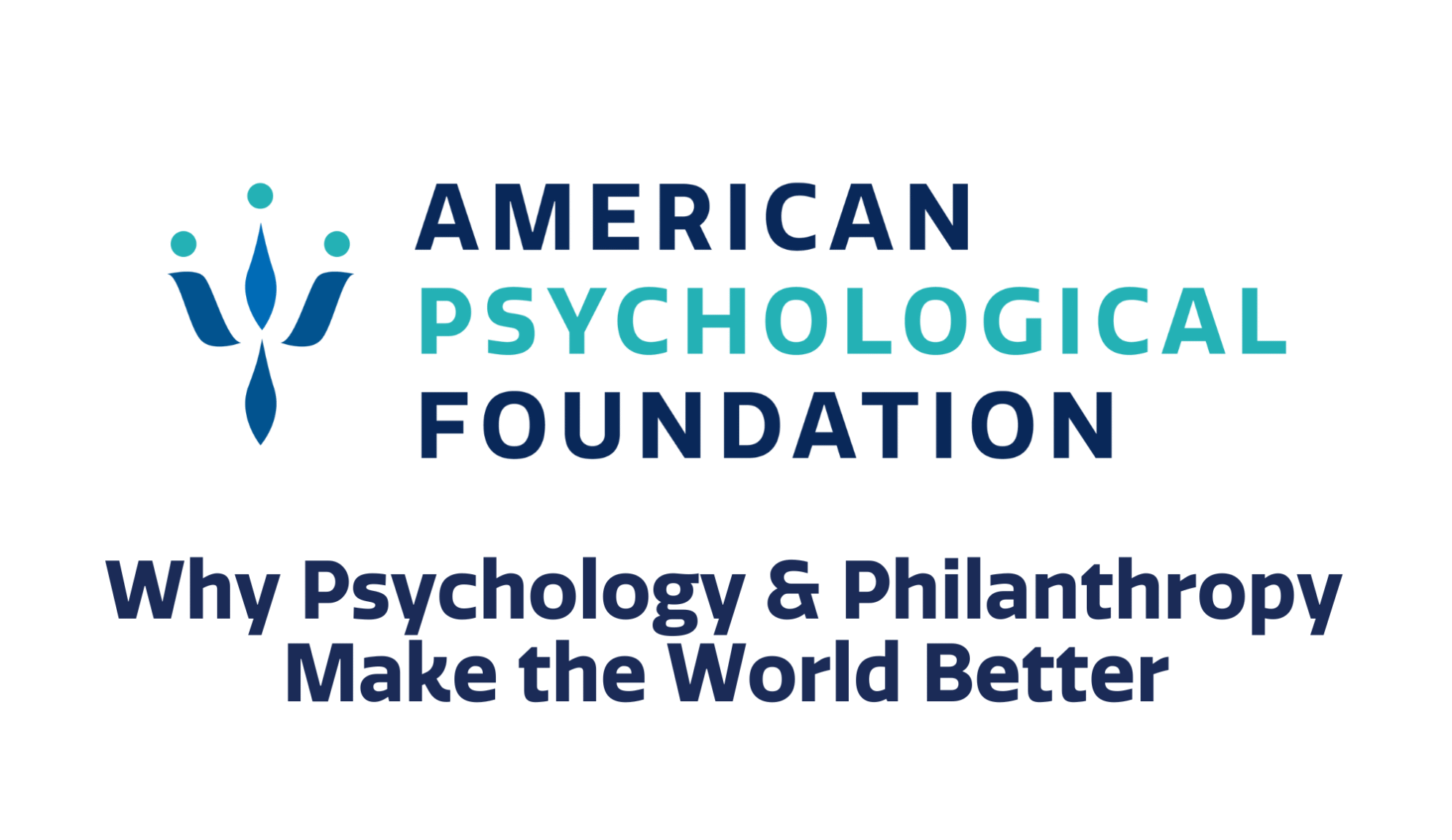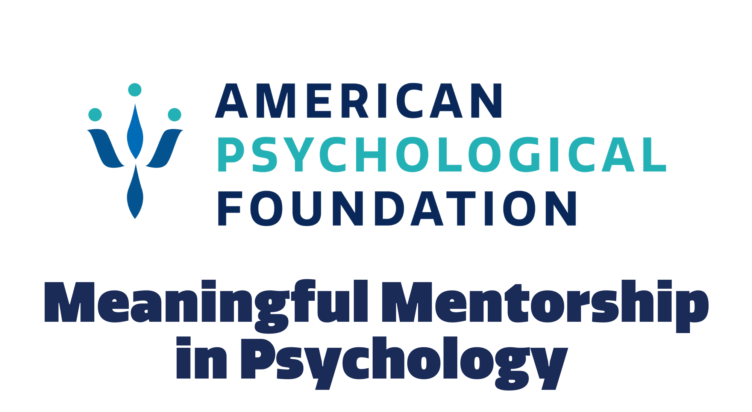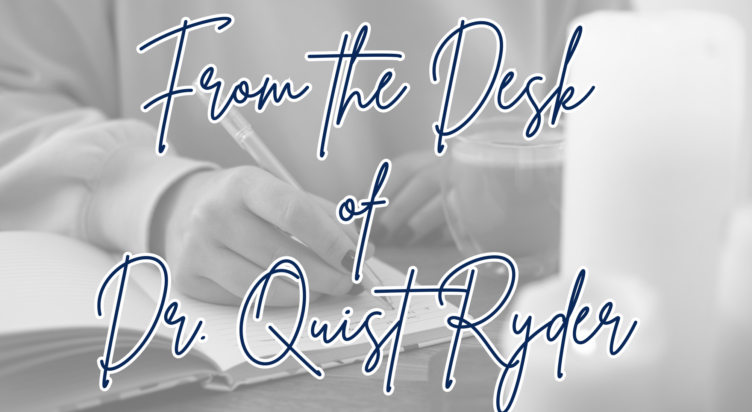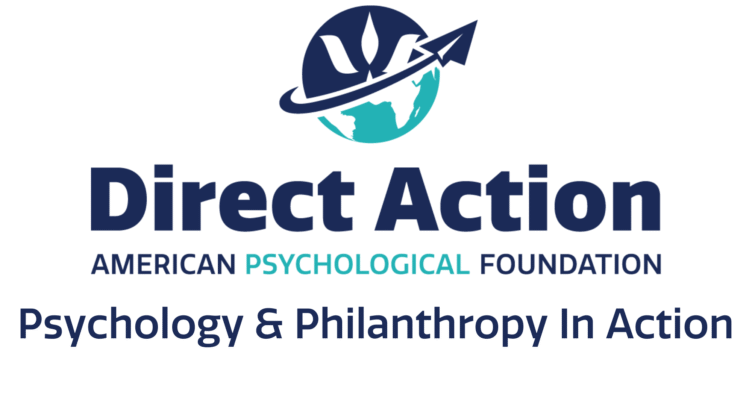Why Psychology & Philanthropy Make the World Better

In this blog post, APF’s CEO, Dr. Michelle Quist Ryder, and APF’s Managing Director & Head of Philanthropy, share their insights on how philanthropy and psychology can work together to create a world where people are healthy, happy, and living with dignity.
Psychology & Philanthropy: More Alike Than You’d Think
Psychology and philanthropy might look different on the surface – one rooted in science and data, the other built on generosity and giving. But if you look closer, you’ll find that they have more in common than you’d think. At their core, both are about helping people live more fulfilling lives.
Psychology utilizes evidence-based science to help us understand what it means to be human. Philanthropy is grounded in generosity, compassion, and the desire to give back. When they intersect, philanthropy puts psychology into action, turning research findings and practice into a direct impact on people and communities. They’re essentially two sides of the same coin, sharing the goal of making people’s lives better, and creating long-lasting, meaningful change in the world.
At APF, we’re constantly reimagining ways psychology and philanthropy can intersect to change the world for the better. Our mission lives at that intersection: leveraging the power of philanthropy to advance psychological knowledge by investing in innovative research and applications that prioritize people and their wellbeing. Through our programs, which fund groundbreaking research and implementation efforts, and through partnerships with donors, volunteers, and organizations that want to make a difference, we support both the science that helps individuals & communities thrive, as well as the researchers who make this science possible.
When paired with philanthropy, psychology’s reach has no limits. Their combined power causes a ripple effect that touches individuals, strengthens communities, and helps build an overall healthier world.
Why Psychology Makes the World Better: Insights from Dr. Michelle Quist Ryder, APF CEO

At its heart, psychology is the science of understanding people. Not just how we think and learn, but how we connect, adapt, heal, and thrive. It helps us make sense of what it means to be human, and, just as importantly, how we can build a world that allows people to flourish.
But psychology doesn’t stop at insight. It gives us tools. Tools to strengthen resilience, to heal, to navigate the kinds of challenges that can feel impossible to untangle. When we scale that knowledge beyond individuals – when we let evidence guide how we shape policies, design schools, structure communities, and deliver care – psychology becomes a quiet but powerful force for systemic change. Strong systems create strong communities. And strong communities help people live healthier, more meaningful lives.
Of course, a community is only as strong as its capacity to include everyone who calls it home. Flourishing isn’t evenly distributed, and neither are the barriers that keep people from accessing care. Psychology helps us see those inequities clearly, not as distant statistics, but as lived realities that shape daily life. It reminds us that no two communities share the same histories, needs, or strengths. Real impact begins with listening deeply, with building evidence that reflects lived experience. With support that’s tailored, not templated. Equity isn’t a side note to well-being; it’s the heartbeat of thriving communities.
Psychology’s reach is woven through every part of us, tracing the quiet conversation between our minds and our bodies. They are, in truth, one system, constantly speaking in pulses and patterns. Stress leaves its fingerprints on our health while hope mends what pain frays. Understanding this delicate interplay helps us create care that honors the full complexity of being human: mind, body, and community in concert. (You can read more about the connection between our minds and bodies in my World Mental Health Day blog post.)
These are just a few reasons why I believe, deeply, that psychology gives us the tools to build a better world. Not in a grand, cinematic sweep, but through the steady work of strengthening the human fabric: nurturing empathy, fostering resilience, advancing equity, and supporting healing at every level.
And when psychology links arms with philanthropy, its reach extends even further. Philanthropy helps ideas take root, fueling the translation of research into action, investing in innovation, and expanding access to care. Together, they form a force capable of reshaping systems and building a future where well-being isn’t a privilege, but a shared foundation. That’s exactly what we believe at the American Psychological Foundation: that psychological science, when supported and shared, can change lives, and, over time, build a world where people are healthy, happy, and living with dignity.
Why Philanthropy Makes the World Better: Insights from Faith Anderson, APF Managing Director & Head of Philanthropy

Director & Head of Philanthropy
Like psychology, philanthropy is ultimately about people. It’s built on connection, trust, and a shared goal of improving lives and the personal belief that we can make the world a little bit brighter. It’s through the small moments in philanthropy that truly lead to a lasting impact, no matter the size or form of support. Contributing to philanthropic causes that you care about go far beyond simply making a donation – whether it’s through giving your time, expertise, or resources, this support is a direct investment in creating a positive change in our world.
At APF, this investment reaches the students, researchers, clinicians, and practitioners who are actively turning psychological science into real-world impact. For example, take Dr. Kiara Alvarez’s work funded by APF’s Direct Action Visionary Grants, which delivers a tested, culturally tailored intervention by community health workers to Latine caregivers of youth experiencing suicidal ideation or behavior. By addressing the unique needs of Latine communities in new immigrant destinations, with APF’s support, Dr. Álvarez is able to bring her work straight to the people it’s meant to serve. Another example of this direct impact can be seen through Joonwoo Lee’s work supported by APF’s Roy Scrivner Memorial Research Grant. Joonwoo’s work explores the experiences of transgender and nonbinary (TNB) individuals facing parental relational trauma and its effects on well-being. With APF funding, Joonwoo developed a grounded theory that both deepens the understanding of these challenges, and identifies pathways to healing and resilience for the TNB community. This support ensures that his findings will inform real-world interventions for the community he serves. While APF has funded countless other projects making an impact across communities, these examples show just how transformative philanthropy can be in turning psychological science into meaningful change. Without it, many researchers would face far more hurdles in reaching those who need their work the most.
Philanthropy is also an investment in community. It brings people together around a shared vision for a more equitable and compassionate world. By joining philanthropic causes that matter to you, you become part of a network of like-minded people who believe in a better future. At APF, this means that you become our mission partner in advancing psychology’s potential, bringing psychological science out of the labs and journals and into the real world. You allow philanthropy to become a catalyst for impact and innovation, leading to breakthroughs in psychological science that would not otherwise be possible.
In itself, philanthropy is a powerful way to bring people together to change the world. When it intersects with psychology, the impact grows even stronger. No matter the size or form of support, any type of contribution can make a difference in psychology’s ability to change the Together, psychology and philanthropy make it possible to provide programs with culturally appropriate and accessible mental health services, create scientifically sound resources for communities, and equip researchers with tools to find the solutions that change lives. Through philanthropy at APF, our collective efforts build a future where psychological science gives everyone the opportunity to thrive.
When Psychology & Philanthropy Come Together
Psychology & philanthropy are each powerful forces, but together, their potential multiplies exponentially. At APF, the synergy between psychology & philanthropy fuels everything we do.
When they intersect, they create a cycle of impact. Philanthropy allows researchers to create solutions for the people and communities who need them most, while psychology ensures these efforts are guided by science, empathy, and a deep understanding of what it takes for people to thrive. Together, they turn research into action, moving psychological science from labs and journals into the real world.
On their own, psychology and philanthropy each make the world better. When combined, their potential becomes limitless. By combining what we know from psychological science with what we give through philanthropy, we can turn research into reality, connect people around a shared purpose, and make the world brighter through science, compassion, and equity.
Join APF in making the world better through Psychology & Philanthropy! Your support directly advances initiatives that make psychology more accessible, equitable, and effective for everyone. Donate to APF today!
Topics: CEO Blog Philanthropy With Faith
Discover More

Meaningful Mentorship in Psychology with APF’s Early Career Psychologist (ECP) Committee Chairs
January is National Mentoring Month, and at APF, we know that mentorship is essential in shaping the next generation of researchers and psychologists. Supporting students …

APF’s 2025 in Review: Moving Psychology Forward
From the Desk of Dr. Quist Ryder is a space for APF’s CEO to share insights and observations on APF initiatives, the state of psychology, …

Psychology & Philanthropy In Action with Dr. Kiara Álvarez
At APF, we’re bringing together the shared power of psychology and philanthropy to create a world where people are healthy, happy, and living with dignity. …
